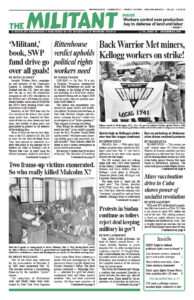OMAHA, Neb. — With spirits high, workers on picket lines outside the Kellogg’s plant here Nov. 17 said they’re determined to win their strike against divisive two-tier wages.
The 480 workers here are striking along with over 1,000 other members of the Bakery, Confectionery, Tobacco Workers and Grain Millers union at Kellogg’s cereal plants in Memphis, Tennessee; Battle Creek, Michigan; and Lancaster, Pennsylvania.
The main issue is “equal pay for equal work,” Dan Osborn, president of BCTGM Local 50G, told the Militant. New hires, who the company calls “transitory,” are paid less and get fewer benefits. Kellogg’s wants to create more profitable divisions among workers, demanding the end of a 30% cap on the number of transitory workers they can hire. “If we allow that,” Osborn said, “eventually the whole workforce would be at the lower level of pay and benefits. We want parity for new workers while they want to bust the union.”
The union proposes that “after four years probationary workers would reach the top levels,” he said.
“It can take as much as eight years now to get to be a regular worker,” said Jeff Jens. “I am a second generation Kellogg’s worker and I want it to be a place where my kids can work if they choose.”
The union knows of only five who crossed the picket lines, he said. He estimates the company is working at 20% of capacity. “They are using temporary workers and offering them $26 an hour, with signing bonuses. Ordinarily probationary workers only make $19 an hour.”
Strikers picket four hours a day, three days a week, although many come to the lines more often. Some have gotten temporary jobs until the strike is over.
The company “cut off medical benefits on the first day of the strike,” Osborn said. It also “got a restraining order limiting what pickets can do.”
Douglas County District Court Judge Timothy Burns issued the order Nov. 10, hours after the company filed a lawsuit against the union. The order is an attack on strikers’ freedom of speech and assembly. It prevents them from trying to stop vehicles and talk to scabs going into the plant, Osborn said.
‘Workers are sticking together’
“This is my first union job and my first strike,” said Lorianne Tartaglione, who has worked for 16 years as a machine operator at the plant. “But I have learned about the importance of the union and sticking together. I will go back into the plant with my head held high.”
“I worked as a transitory worker for five years. In that whole time I had a total raise of $1.40,” said Edward Tibbs, who was recently made a permanent worker. “I was doing the same work as someone making $10 to $15 an hour more than me. I had to pay 20% of my health coverage with a $3,500 yearly deductible and no dental coverage or pension.
“This strike has gotten a lot of support from other unions. When this is over, if I see other folks on strike I will walk their picket lines with them,” he added. Local unionists have helped construct weatherproof shelters at all the picket sites here.
“We had been working six and seven days a week, mostly 12-hour shifts,” said Tristan Farley, a transitory worker. “The company says it is not sustainable to have everyone paid the same wages, but how is it sustainable to give their CEO a $2 million raise and rake in all the profits that they have over the past couple of years?”
Talks resumed briefly between the union and the company Nov. 22. The next day bosses announced they would start hiring permanent replacement workers in an effort to break the strike.
Solidarity with the strike is crucial. Go to the BCTGM Local 50G’s website, where information on how to donate to each of the four locals on strike is posted.

